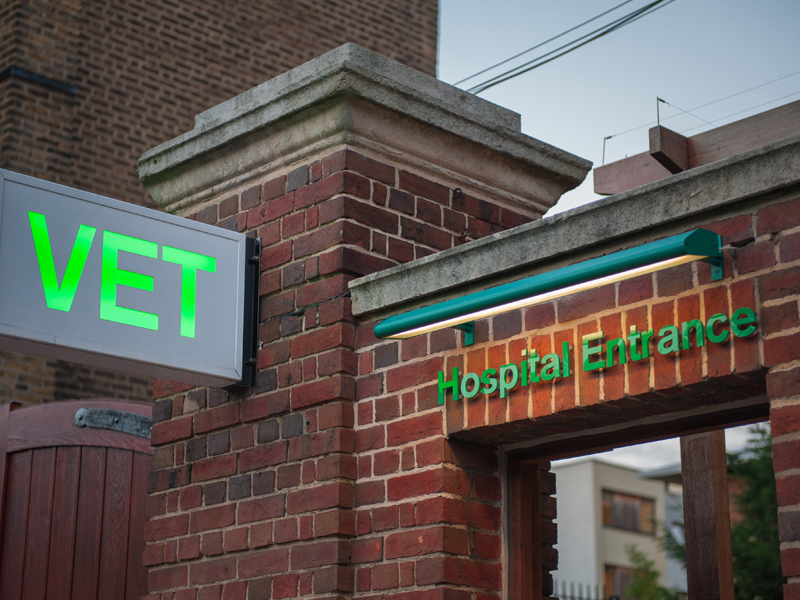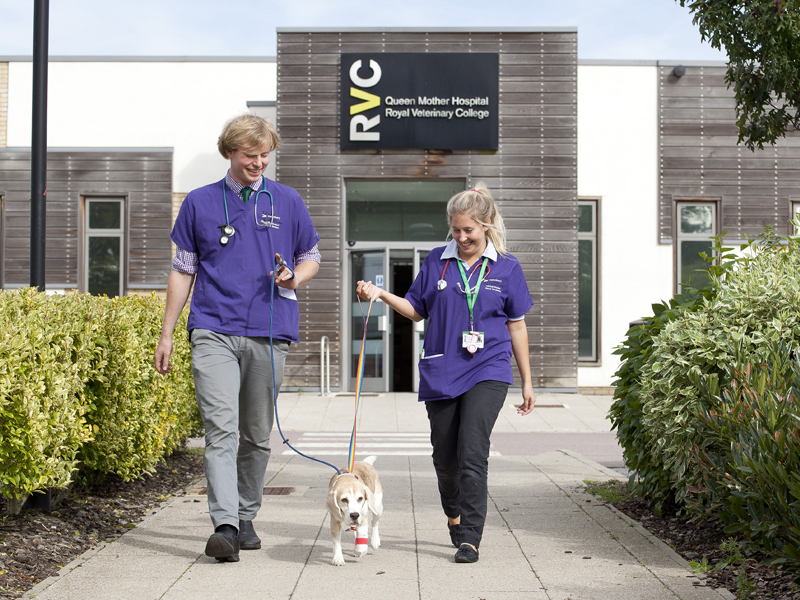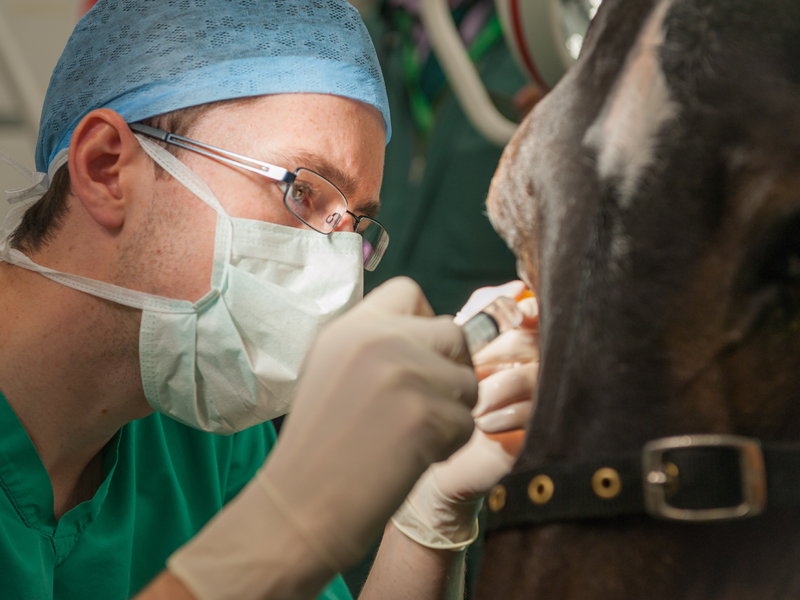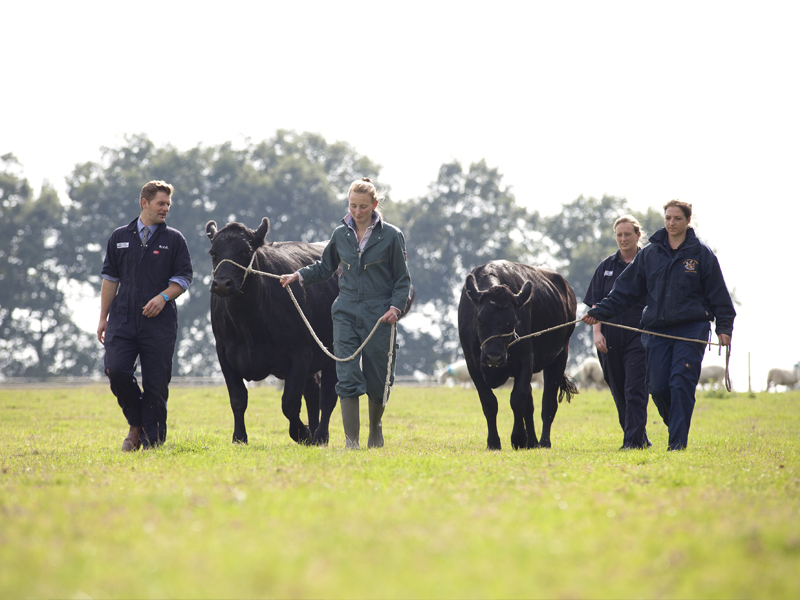Facilities
Whether you are discovering new subjects in our lecture theatres, or applying your knowledge in a practical scenario, we have the facilities to provide the best possible learning environments for scientists, veterinary surgeons and veterinary nurses.
Practical environments
A fundamental part of our courses is the practical experience you gain that will prepare you for your career once you have graduated. We believe that is critical to your development that you are able to apply your theoretical learning in a practical environment, and in some situations, to real-life research or client cases.
Laboratories: You will find laboratories and microscope rooms situated in both campuses, with all the equipment you will need for your course.
Clinical: Depending on your course, you can gain practical experience in our three animal hospitals, two first opinion practices, including an exotics service, and our own farm.
Learning technologies
Our innovative curriculum is complemented by a number of technologies we have made available to assist your learning.
On-demand lectures: Our Echo360 programme allows you re-watch or catch up on lectures by providing a recorded lecture through our virtual learning environment.
Live streams: Lectures and events are live-streamed and available to view on demand.
Virtual learning environment: RVC LEARN allows you to work remotely, submit work online, and access course materials as and when you need them.
Visual classrooms: Display screens in classrooms for small groups to provide a clear visual aid to intricate aspects of your course, including dissections and microscopic images being worked on by lecturers and tutors.
First opinion small animal practice
Our first opinion animal hospital is based at the Beaumont Sainsbury Animal Hospital at our Camden Campus. The hospital offers a full range of services for dogs, cats, rabbits, reptiles, birds and other small animals, from vaccinations and neutering to medical diagnosis and life-saving operations.

Our dedicated team are committed to providing excellent care and treatment. Each member of our team has a special interest in particular fields, such as dentistry, diagnostic imaging, medicine, surgery and exotic species. This means all species receive expert treatment by genuinely interested and caring practitioners.
If you are studying veterinary medicine, you will have the opportunity to participate in all aspects of client and patient care under the supervision of experienced veterinary surgeons and registered veterinary nurses. The practice is a leading centre for veterinary nurse training, and if you are studying veterinary nursing, you will have the opportunity to support the nursing team in the care of animals and client services under the supervision of qualified veterinary surgeons and experienced registered nurses.
Services
- Puppy and kitten health checks
- Vaccinations
- Neutering
- Examinations, advice and treatment for unwell pets
- Advanced diagnostics for illness or injury
- Surgical procedures and diagnostic imaging
- Specialist exotics first-opinion and referral service
Small animal referral hospital
Our small animal referral service is based at the Queen Mother Hospital for Animals (QMHA) at our Hawkshead Campus. The hospital is the largest full service referral hospital in Europe, with the greatest concentration of veterinary specialists and specialists-in-training (95 from over 20 countries).

We offer a responsive, friendly and helpful service to referring vets and pet owners 24 hours a day, 365 days a year. Our world-class specialists and clinicians treat over 9,000 animals each year, leading the way in clinical practice and are at the cutting-edge of veterinary medicine.
Veterinary medicine students will have the opportunity throughout the Clinical Extra-Mural Studies part of the course to work and learn in the small animal referrals hospital. You will dedicate time to gaining practical clinical experience with real life cases, consolidating your learning about diagnosis and management of animal diseases.
Veterinary nursing students will also work and learn in the QMHA, developing practical care skills, client care, and management.
The experience gained in our hospitals will expand your knowledge and understanding of how veterinary practices and organisations operate, and help you develop your soft skills and become confident in case management. This is a vital part of graduating from your course ready for work.
The Queen Mother Hospital for Animals is accredited by the AVMA, RCVS and EAEVE.
Services
- Anaesthesia and analgesia
- Cardiology
- Critical care
- Dermatology
- Diagnostic imaging
- Emergency referral
- Exotics
- First-Opinion Emergency
- Internal Medicine
- Neurology and neurosurgery
- Nutrition
- Oncology
- Ophthalmology
- Orthopaedic surgery
- Physiotherapy and rehabilitation
- Soft tissue surgery
- Transfusion medicine
Equine hospital
Our equine hospital is located at the Hawkshead Campus with a long and rich history in equine health management. The hospital combines world-leading research with the largest number of RCVS recognised equine specialists of any UK veterinary teaching hospital to provide a 24-hour emergency and referral service.

We also operate a first opinion equine only ambulatory practice that is backed up by the most advanced techniques, patient care and facilities.
Committed to educating equine vets and specialists of the future, veterinary medicine students will be involved in cases at the equine hospital, where you will be working with the equine team responsible for delivery of care for patients. You will also receive training in the primary care of equine patients in the ambulatory practice – experience that provides you with the essential building blocks, known as ‘day one skills’, for your transition into practice after successfully completing your course.
Boltons Park Farm
Based on the Royal Veterinary College's (RVC) Hawkshead Estate in Hertfordshire, Boltons Park Farm has been an essential part of the RVC’s activities for over 45 years.
The farm consists of 200 hectares of mainly grazing grass, along with 14 hectares of wildlife stewardship plots planted last year and 20 hectares of ancient mixed woodland along with the younger woods that we have planted over the years.

Boltons Park Farm is currently milking 100 Premium Cattle Health Scheme IBR and BVD accredited pedigree Holstein Friesian cows and rear 70 young stock. Students can get involved in all aspects of the dairy.
Also on the farm are 400 sheep of mixed breeds that mostly graze all year in the fields. Our Norfolk Bronze and Black turkey flock are reared in environmentally enhanced conditions. The breed is ideal as it suits our rearing system, is slow growing, and produces a beautiful product. Also, 40 laying hens are on the farm with eggs sold to staff, students and local residents.
Services
Boltons Park Farm is our farm animal practical teaching facility. All Veterinary Medicine, Veterinary Nursing and Animal Biology, Behaviour, Welfare and Ethics students will visit the farm at certain stages of the course. The farm is also a good source of extra-mural placement opportunities. You will carry out various activities here, such as:
- Fortnightly herd and flock health visits
- Lambing practical sessions and night watch
- Lameness scoring
- Emergency vet visits
- Clinical examination and rectal examination classes
- Elective projects and presentations
- Housing, feeding and nutrition classes
- Routine testing
- Animal handling practical sessions
- California milk testing
- Cattle foot trimming and sheep foot examination
- Animal welfare sessions
- Poultry handling and management farm appraisals
- Turkey production at Thanksgiving and Christmas
- Confidence days to build up confidence of any students who need additional support in certain skills
- Immersive animal husbandry practicals
